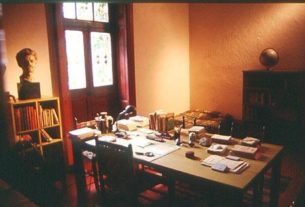Arts of Mexico
This June one of Mexico’s most venerated composers comes to Washington, DC. The life and loves (and there were many) of Agustin Lara will be brought to the stage in a work commissioned by the Gala Hispanic Theater. The Spanish production with English subtitles – written by Argentine filmmaker and playwright, Gabriel Garcia – will run for six weeks and is sure to be a treat for the many Americans who have never had the pleasure of being introduced to this profoundly important creator of some of the most beautiful songs of the twentieth century.
Several years ago, I had written an article on Lara for Mexconnect and was intrigued by the man and his background, his life being as exceptional as the music he produced. El Flaco de Oro (The Skinny One of Gold), as he was known, was an emaciated, unattractive man disfigured by a scar that ran from mouth to ear – the legacy of a jealous prostitute allegedly wielding a broken bottle. Within that wrecked body lived a complex soul – a gifted poet (known for his eloquence), an admirer of prostitutes (many of whom he’d loved and wrote songs for during his early days playing piano in the bordellos of Mexico City), a lover of countless women (five of whom became his wives, one being Maria Felix, said to be the most beautiful woman in the world at the time) who was as much at home with elegant living as he was in vulgar surroundings.
He loved music. The sheer quantity and diversity of what he produced gives evidence of that. He loved women. “Woman is the reason for my existence,” he’d been quoted as saying. And he loved Veracruz. To this day it’s still an ambiguous question as to whether he was really born there as he claimed or in Mexico City. He lived intensely and his music reflected the intensity of his life.
Within that framework of his bigger than life self, he embraced a culture, carried its soul, captured its essence in the post-revolutionary days – and even more extraordinary – managed to capture the hearts of the people from every other Spanish speaking nation. His songs speak to the universal heart, his lyrics are still memorized by many, and his music is as much alive today as it was in the ’40s and ’50s when he was at the height of his career.
So you can imagine my excitement when I heard that a play on his life was to be produced in the United States. When I learned the playwright was Argentinean, not Mexican, I was curious as to why, and I asked Gabriel Garcia, the playwright, if I could interview him. He graciously accepted.
Q: Perhaps you can tell me a little about yourself – your background. I understand you make documentary films, so I wondered how you’d come to the decision to write this play?
Garcia: Actually, I studied theater in Paris when I was in university, and I have a lot of experience in theater production working as producer, director, and writer. I’ve also adapted theatrical plays for TV and film.
Q: Really? What networks have you worked for?
Garcia: BBC, Telemundo, Channel 13 in Buenos Aires, and Channel 5 in Boston, among others. In fact, I earned an Emmy for one of my documentaries called The Promised Land.
Q. It looks as though you’ve had quite an extensive amount of experience in many cultures. What brought you to the United States?
Garcia: The political situation in Argentina. I worked mostly in the States after finishing school, but when democracy arrived in my country, I was invited to return to live and work. I was there for eight years doing documentary films for national and international release. After that, I took a job in Central America to produce and direct television.
Q: I understand you’ve won a number of awards for your work. Can you tell me about that?
Garcia: Yes, I received an Emmy for my documentary, The Promised Land. And I’ve also received two Peabody Awards. Ohio State University has also given me an award for my film work.
Q: Have you done much in the theater?
Garcia: For the past 20 years I’ve directed plays by well-known Latin American writers both in the U.S. and Argentina. I’ve been going back and forth between the countries for years, working in both, but last year I settled in Hollywood, which is where I’m doing both theater and documentary work.
Q: Where did you first hear about Agustin Lara?
Garcia: Though he was born and worked mostly in Mexico, he’s a well-known composer in all Latin America. Many of his songs – such as “Maria Bonita” and “Granada” have been popular songs interpreted by international singers. Placido Domingo made “Granada” a huge hit, but few know it was written by Augustin Lara. The immense popularity of his songs has transcended the composer. I grew up listening to “Maria Bonita” and heard “Granada” in every country. It was only recently that I realized the author was Agustin Lara. Everyone, of course, knew his name but not what he wrote.
Q: Speaking of “Granada,” there’s something I’ve always found curious. Lara wrote the song before ever seeing Granada. Have you any theories about that?
Garcia: Well, in fact, I do. Did you know that Federico Garcia Lorca, the Spanish poet, and Lara were in Buenos Aires during the same period? Garcia Lorca was born in Granada and loved his birth place. I think it’s quite likely the two met, as they would have traveled in the same circles, and I could imagine his describing Granada to Lara who then saw it through his own imagination.
Q: How did the idea of writing a play about Lara come about?
Garcia: This project was commissioned by the Gala Hispanic Theater of Washington, DC. I accepted when I started to investigate his life. Maybe he fascinated me because his story is so close to my other work at this time. I’m editing a documentary on the Human Spirit, an hour and a half film about people who start from nothing and push on to great things – like Agustin Lara.
Q: He’s not very well known in the United States. Are you having a hard time finding material?
Garcia: Actually, his songs do have an excellent reputation in the U.S. People just don’t know it’s him! It is difficult but not impossible to research his life.
Q: Lara was a very colorful personality. What are some aspects of Lara’s character that you’d like to bring out or what parts of his life interest you the most?
Garcia: As an artist myself, I’m primarily interested in Lara as an artist. My focus will be on his spirit, his need to create, his successes, his attraction for and from women, and his struggles. His Mexican culture will figure in the work as that which nurtured him.
Also, how a man who was called El Feo (The Ugly One) made his way so successfully – particularly with women. It’s something not only interesting in itself, but represents his determined drive that figures in everything he did. He was so good with his poetry that I think no one really saw him. They could hear him, they could dance to his music, they could perceive him through the emotions he evoked. But nobody really saw him the way he was. They appreciated him and his music.
Q: There’s a lot we know about Lara, and a lot we think we know about him. To some extent, he created his own myth and sometimes it’s hard to separate fact from fiction. How do you plan to handle that in your play?
Garcia: I plan to open with a scene after his death where his wives are together and talk about him. To some extent, they’ll discuss this ambiguity about the man.
Q: Will the play be a musical or a drama?
Garcia: It will certainly be a musical, but not in the Broadway sense. It will be my personal view of his life and times, close to the reality but not a linear biography. I will be exploring his conflicts, his success in the face of his looks, his lack of formal education, his self-taught piano and even his self-taught composing.
Q: Are you going to be directing the play?
Garcia: No. It’s a frustrating thing for me. I’d love to direct it but someone else is going to do it. But I will be in Washington in April to oversee what the director is doing.
Q: Will you be taking the show on the road?
Garcia: We’ll see. I would love to.


